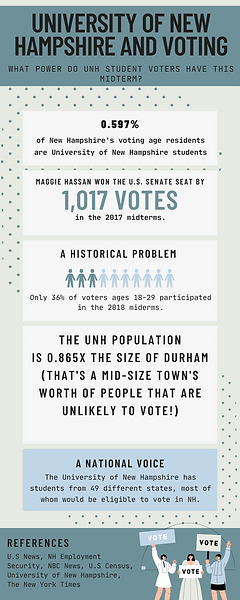UNH Voters' Potential to Impact Midterm Election
Youth's Importance in Election Results
By Sarah Donovan, Victoria Fluet, Aleksandra Bedard, and Kaylin Moriarty
In the state of New Hampshire student voters hold the power to sway election results. With young people being a historically under-registered demographic, the University of New Hampshire (UNH) has many organizations and advocacy groups that are working to tap into a demographic which when fully present in elections often changes the outcome. One of the most visible organizations campaigning this year is OrganizeNH. Part of a state-wide organization affiliated with Student Democrats, Meghan Jackson runs the University of New Hampshire campaign. When asked why she believes youth voting has historically been low, she emphasized knowledge: “Lack of education for sure, …. students are unaware that they can still vote where they live.” OrganizeNH is a source of information for voter registration, absentee voting, and voting as an out-of-state student. Their voter protection team allows youth voters to call and ask questions while registering to vote and voting if they suspect they are being unfairly kept from participating. There are currently 700 students in the OrganizeNH database. Planned Parenthood Generation Action, is another organization that has been encouraging voters on campus by hosting meetings, phone banking and campaigning. Social Media Chair, Margaret Miller, stressed that New Hampshire is a purple state and a high turnout of blue voters could select candidates who prioritize the right to an abortion. “One thing that I want to say to college voters…. vote with the idea in mind that your voice does have an impact on the people that you love,” said Miller. “I want people to prioritize the rights of those that don't necessarily have the ability to use their voice in the manner that is voting.” College Republicans did not respond when asked for comment. On election day, Student Senate hosted a “Party to the Polls” with UNH Community and Civic Engagement. Student Body President Emily Dennison said the event aimed to answer any voting questions and provided transportation complete with catered Dunkin Donuts, The Works, Durham House Of Pizza, and live music. When asked if she had to tell students one thing, Dennison said “Your vote matters.” Student Senate additionally provided students with an informative email with a breakdown of how to register to vote, information about voting on the UNH campus and transportation resources to the polls. Student Body Vice President Dina Rathke said that she thought students tabling and hosting events such as Party to the Polls is a more personal approach to voting that will entice students to vote. “I see it as your civic duty. You’re granted the right to vote not everyone has that privilege,” said Rathke. On election day UNH offered a shuttle service for students who would like a ride to the polls at Oyster River High School. Beverly Cray, manager of UNH Transportation Services, shared that in past elections people took advantage of the shuttle service and UNH Transportation feels it is important to provide this as a resource for students. In the leadup to the election, Ann Shump, the head of Durham’s supervisors of the checklist, collaborated with the UNH administration to hold a voting registration drive at Philbrook Dining Hall on Oct. 25. There was also a drive at the Holloway Commons Dining Hall at an earlier date. Both events only required students to bring an ID and proof of New Hampshire residence. Despite a turnout of 150 students, Shump anticipated an influx of day-of registrations. She emphasized that the supervisor of the checklists’ role is not to advocate for student voters but to streamline the process of registration. When young voters show up, it can be hugely influential. NBC writes that young voters “...are the only age group that leans Democratic”. Tufts University specifically places New Hampshire youth voters as having the #6 most Senate race influence out of fellow youth voters. UNH Poli Sci professor Andrew Smith believes that students may not have the power to swing the election. According to his estimates, only about 40% of college students will vote. Despite a push for involvement from politically-focused student organizations, few political candidates have come to visit the university. Smith attributes this to college students’ low voting rates in midterm elections. Still, he feels the power of the college vote can’t be determined by a single individual. “You have as good of a chance of winning the lottery as having your individual vote matter in an election. It’s the collective action that matters.”
